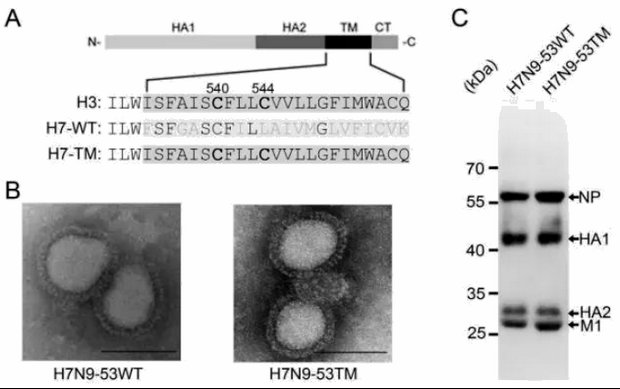Professor Yongchang Cao’s team achieved breakthrough progress in broad-spectrum H7N9 influenza virus vaccine research
Source: School of Life Sciences
Written by: School of Life Sciences
Edited by: Wang Dongmei
Recently, Professor Yongchang Cao’s team in the State Key Laboratory of Biocontrol in the School of Life Sciences of Sun Yat-sen University published a study titled "A recombinant H7N9 state-run influenza vaccine have the H7 hemagglutinin transmembrane domain replaced by the H3 domain induces increased cross-reactive antibodies and improved interclade protection in mice" in an international antiviral authoritative journal
Antiviral Research. In the research paper, they reported a novel inactivated H7N9 influenza virus vaccine with structure modification on hemagglutinin protein (HA) and proved the whole virus inactivated vaccine could stimulate the body to produce broad spectrum of cross immune response and cross protection within the H7N9 subtype.
Since the first report of H7N9 influenza virus infection in human in March 2013 in China, we have experienced five waves of epidemics of the virus. So far, there are 1364 cases of infection (till 1st April, 2017); the mortality rate reaches 30%. H7N9 flu virus is not only a potential pandemic threat; it can also cause huge losses to poultry industry. Like other influenza viruses, H7N9 influenza virus mutates rapidly, and can form multiple genotypes. Therefore, it is necessary to develop a H7N9 flu virus vaccine with broad cross protection effect.

Previously, the research team proved the transmembrane domain (TM) of the HA protein in H3 subtype is important for stability and cross immunogen of the HA protein. To increase the cross-protection among different flu subtypes, the team enhanced tripolymers of H1, H5 and H9 HA proteins through a TM-replacement strategy. In the research of H7N9 vaccine, the team replaced the HA protein of H7N9 into the HA TM of H3 subtype and rescued a recombinant H7N9 virus with TM replacement utilizing reverse genetics. In animal model of mice, the inactivated virus vaccine produced by recombinant H7N9 virus could induce higher HI antibodies, HA specific IgG antibodies and HA specific IFN- cytokines against strains of different clades. The vaccine could provide full protection against homologous and heterologous H7N9 virus challenge in mice. After vaccination, virus titer could not be detected in lungs after virus challenge in mice and the mice did not present any significant lung lesions or inflammatory responses.
Yang Wang, a PhD student in the lab, is the first author and Professor Yongchang Cao is the corresponding author in this paper.
Professor Yongchang Cao has been working on animal virology for a long time. He received successively grants from NSFC, 863 projects, the national key research and development projects and Guangdong province natural science foundation. More than 30 SCI research papers were published. At present, the team is working on control of the influenza virus and the mechanisms of genetic evolution and immune escape of the Coronaviruses including PEDV and IBV. Many research findings have been achieved.
